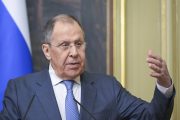
The next “health emergency” of planetary scope is a “matter of when, not if,” proclaimed Tedros Adhanom Ghebreyesus, director-general of the World Health Organization (WHO) in Davos today.
While, according to the WHO, the pathogens that could cause the next pandemic range from SARS and MERS to Zika and Ebola, the participants of the World Economic Forum’s panel discussion decided to focus on the so-called Disease X, which is “unknown but can happen,” as described by Tedros. The WHO has already estimated that Disease X will be 20 times deadlier than Covid, according to the original description of the session. Such a devastating future emergency will certainly require “global coordination and participation,” agreed the participants.
Tedros, one of the keynote speakers, opened his remarks by clarifying the concept of Disease X, describing it as a “placeholder” definition for a yet-unknown disease that would be caused by a yet-unknown hypothetical pathogen. He reminded the audience that the WHO first came up with the definition back in 2018 by putting Disease X on its shortlist of “prioritized” diseases and pathogens with the strongest potential to cause a global health emergency. In this sense, Covid-19 was the first Disease X, and “we were preparing for Covid-like disease” since 2018, confessed Tedros. In an apparent attempt to explain the ineffectiveness of these preparations, the WHO chief reiterated the falsehood of “overwhelmed” hospitals short on staff, space, and resources, which allegedly resulted in a loss of “many people,” while also criticizing Western countries for failing to invest in basic primary care systems while prioritizing cutting-edge technologies such as robotic surgeries.
Tedros further stressed that the preparations for Disease X are based on the lessons learned from the Covid pandemic response. The admission signifies that the measures put in place during 2019-2023 should be expected to be utilized again, as was evident from the panel discussion. One such measure is a mass-vaccination program. The WHO director signaled that all nations should have “equitable” access to the shots, not just the rich countries that were “hoarding” them during Covid. Left unsaid was that African and some of Asian countries with low vaccination rates fared much better in Covid cases, hospitalizations, and deaths compared to the countries with high vaccination rates.
As part of the solution to universal access to vaccines, said Tedros, the WHO helped 15 countries in all geographical regions establish their own production of mRNA vaccines.
Another part of the preparations facilitated by the WHO was the establishment of the pathogen surveillance system called the BioHub System, a type of “pandemic intelligence” that would presumably help identify pathogens with epidemic and pandemic potential and allow for the quicker development of vaccines. It is worth noting that the WHO partners with groups such as the infamous EcoHealth Alliance, which was responsible for channeling American funds and technology to the Wuhan Institute of Virology (WIV) to conduct gain-of-function research on bat coronaviruses that triggered the Covid pandemic, investigation of whose origins was quietly shelved by the WHO last year.
Lastly, all WHO members should sign the so-called Pandemic Agreement by May 2024, said the WHO director, elaborating that “narrow national interests should not come into the way” of a concerted response to a “common enemy.” Roy Jakobs, president and CEO of Dutch multinational conglomerate Royal Phillips, echoed the sentiments by criticizing the “people” for becoming overly “centric of their interests,” which undermined the “fair allocation of means” and thus hindered the response to the “global crisis.”
Tedros warned that “without a shared response … we will face the same problem as [we did during] Covid,” but did not explain the ramifications of the treaty for national sovereignty, which would be transferred to the WHO, which would receive the power to announce the state of emergency, decide on pandemic response measures such as lockdowns, vaccine mandates, use of early treatments, medical protocols, censorship of “misinformation,” implementation of vaccine passports, travel and business restrictions, and distribution of resources.
Another panelist, Preetha Reddy, the top executive of the major hospital system in India, reiterated the notion that Disease X is “definitely a clear and present danger.” Contextualizing the preparations for this “danger,” Reedy emphasized that, similar to how armies undergo regular training for war readiness, healthcare systems need to be prepared for health emergencies. “At any time, anything can happen, and we don’t know what side it is going to come from, and there’s no going away from that,” she said. Reddy stressed that the “decisive leadership” of the nations “to do what we have to do” and “make hard decisions” such as prompt “vaccination interventions” and the implementation of lockdowns is the most important element of the pandemic response.
As for the improvement of medical systems, Reddy said that the implementation of technology in the training of doctors and nurses bore fruit during the Covid pandemic. As an example, she quoted that just within two weeks, her hospital system managed to train as many as 150,000 staffers to use ventilators on Covid patients, showing no remorse for using the invasive measure that was found to cause secondary bacterial pneumonia that killed or injured the majority of its recipients, according to various peer-reviewed studies and doctors’ observations (see here, here, here, and here), including in India.
Michel Demaré, chairman of the board of AstraZeneca, opined that the key to success was two-fold. The first element was public-private partnerships facilitated by the WEF. “We partnered with academia, with government, with regulators, with third-party commercial contractors, and with NGOs,” he announced, saying that that was the prerequisite for the wide distribution of the vaccines, of which he was proud.
Another element, according to Demaré, was “quick action, quick decision-making.” He went on to boast that during the pandemic, AstraZeneca, a multinational pharmaceutical and biotechnology company, manufactured three billion doses of Covid vaccines, two-thirds of which went to low- and medium-income countries via the COVAX program. That notion drew praise from Ghebreyesus, who said that the move “really helped.” Both the WHO director and the pharmaceutical chair failed to mention the inconvenient fact that the jabs had been thrown at poor countries due to their prompt suspension by the developed countries, including Canada, Australia, the U.K., most of the European Union countries, South Africa, Indonesia, and Malaysia. Within mere months of the rollout, these nations found AstraZeneca shots to cause blood clots and other serious side effects.
To better prepare for the next pandemic, Demaré said that the best thing nations could do was to focus on improving the health of their people. For that, he proposed investing more funds into preventing diseases by strengthening health data collection and management and using artificial intelligence to do that. Moreover, AI could “rationalize” budgeting and other aspects of healthcare systems, he maintained. Other panelists agreed on the importance of the advancement of AI in healthcare.
The theme of the ongoing WEF annual meeting is “Rebuilding Trust.” However, none of the speakers, each of whom played a role in Covid response, showed any willingness to take responsibility for the catastrophic effects that Covid measures had on global populations. As a stark example of a lack of regard for everyday people, Ghebreyesus only managed to smirk at the pointed questions of the independent media on the streets of Davos.





